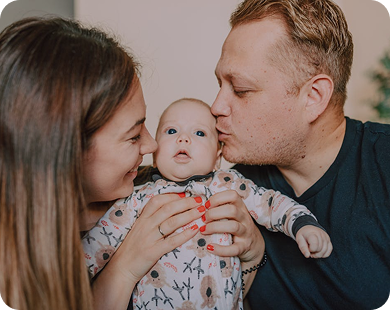Experiencing a failed first IVF cycle can feel devastating, but it's important to know that many patients achieve success in subsequent rounds. Understanding what changes can improve your chances for round two is crucial for moving forward with confidence and hope.
Understanding Why First IVF Cycles Fail
Before diving into what you can change, it's essential to understand that first IVF cycle failures are more common than you might think. Research shows that approximately 60-70% of first IVF cycles don't result in pregnancy, even in the best fertility clinics worldwide.
The reasons for failure can be complex and multifaceted. Sometimes it's related to egg quality, other times it involves implantation issues, or it could be due to factors we haven't yet identified. The key is working with your fertility team to analyze what happened and create a targeted plan for your next attempt.
| Common Reasons for First IVF Failure | Potential Solutions for Round Two |
|---|---|
| Poor egg quality | Improved stimulation protocol, supplements, lifestyle changes |
| Implantation failure | Endometrial preparation optimization, PGT testing |
| Sperm quality issues | ICSI, sperm DNA fragmentation testing |
| Embryo quality concerns | Extended culture to blastocyst, genetic testing |
| Timing issues | Better cycle monitoring, trigger shot timing |
Key Changes to Consider for Your Second IVF Cycle
Protocol Adjustments
One of the most significant changes your doctor might recommend is adjusting your stimulation protocol. If you used a long protocol in your first cycle, switching to an antagonist protocol might yield better results, or vice versa.
Your medication dosages may also need adjustment. If you had a poor response to stimulation, your doctor might increase the dosage of gonadotropins or add additional medications to improve your ovarian response.
Advanced Testing and Diagnostics
Your second cycle is an opportunity to incorporate additional testing that wasn't done initially. Preimplantation genetic testing (PGT) can help identify chromosomally normal embryos, significantly improving your chances of success.
| Additional Tests to Consider | What They Reveal | Impact on Treatment |
|---|---|---|
| PGT-A (Aneuploidy) | Chromosomal abnormalities in embryos | Higher implantation rates with normal embryos |
| Endometrial Receptivity Array (ERA) | Optimal timing for embryo transfer | Personalized transfer timing |
| Sperm DNA fragmentation | Sperm genetic integrity | May indicate need for ICSI or donor sperm |
| Autoimmune panel | Immune factors affecting implantation | Targeted immune therapy if needed |
Lifestyle and Nutritional Optimization
The time between your first and second IVF cycles is crucial for implementing lifestyle changes. Research consistently shows that certain modifications can significantly improve treatment outcomes.
Focus on optimizing your nutrition with fertility-supporting foods and consider targeted supplementation. Coenzyme Q10, vitamin D, and omega-3 fatty acids have shown promise in improving egg quality and overall reproductive health.
Timing Considerations for Your Second Cycle
The timing of your second IVF cycle matters more than you might realize. While it's natural to want to start immediately, giving your body adequate time to recover and prepare can improve your chances of success.
Most fertility specialists recommend waiting at least one full menstrual cycle between attempts, though some patients benefit from a longer break of 2-3 months. This recovery period allows your body to reset hormonally and gives you time to implement beneficial lifestyle changes.
| Recovery Timeline | Recommended Actions | Expected Benefits |
|---|---|---|
| 1-2 weeks post-cycle | Rest, emotional processing | Physical and mental recovery |
| 1-2 months | Lifestyle modifications, supplements | Improved egg/sperm quality |
| 2-3 months | Additional testing, protocol planning | Optimized treatment approach |
Fresh vs. Frozen Embryo Transfer Considerations
If you had a fresh transfer in your first cycle, your doctor might recommend a frozen embryo transfer (FET) for your second attempt. FET cycles often have higher success rates because they allow for better endometrial preparation without the influence of stimulation medications.
The decision between fresh and frozen transfers should be individualized based on your specific circumstances, including your response to stimulation, embryo quality, and endometrial development during your first cycle.
Optimizing Endometrial Preparation
Endometrial thickness and receptivity play crucial roles in implantation success. For your second cycle, your doctor might recommend different approaches to optimize your endometrial lining.
When to Consider Donor Options
Depending on your age and the reasons for your first cycle's failure, your fertility team might discuss donor egg options. This conversation can be emotionally challenging, but it's important to understand that donor eggs can significantly improve success rates, particularly for women over 40 or those with poor egg quality.
Similarly, if male factor infertility contributed to your first cycle's failure, donor sperm might be recommended. These decisions require careful consideration and counseling, but they can open new pathways to parenthood.
The Role of Advanced Laboratory Techniques
Your second IVF cycle might benefit from advanced laboratory techniques that weren't used initially. Intracytoplasmic sperm injection (ICSI) can improve fertilization rates, especially if there were fertilization issues in your first cycle.
Extended embryo culture to the blastocyst stage (day 5-6) instead of day 3 transfer can also improve success rates by allowing for better embryo selection and more natural timing of implantation.
| Laboratory Enhancement | When Recommended | Expected Improvement |
|---|---|---|
| ICSI | Poor fertilization, male factor | Higher fertilization rates |
| Blastocyst culture | Good embryo numbers | Better embryo selection |
| Assisted hatching | Thick zona pellucida, advanced age | Improved implantation |
| Time-lapse imaging | Multiple good embryos | Optimal embryo selection |
Emotional and Psychological Preparation
Preparing for your second IVF cycle isn't just about physical and medical changes. Emotional preparation is equally important for your overall well-being and treatment success.
Consider working with a fertility counselor who can help you process the disappointment from your first cycle and develop coping strategies for the upcoming treatment. Many patients find that addressing anxiety and stress through counseling, meditation, or acupuncture improves their overall treatment experience.
Success Rates for Second IVF Cycles
It's encouraging to know that success rates often improve with subsequent IVF cycles. According to recent studies, cumulative pregnancy rates increase significantly when multiple cycles are considered.
For women under 35, the cumulative live birth rate after three IVF cycles can reach 65-70%. Even for women over 40, second and third cycles often show improved outcomes compared to the first attempt, especially when protocol adjustments and additional testing are incorporated.
| Age Group | First Cycle Success | Second Cycle Success | Cumulative Success (3 cycles) |
|---|---|---|---|
| Under 35 | 40-45% | 35-40% | 65-70% |
| 35-37 | 35-40% | 30-35% | 55-65% |
| 38-40 | 25-30% | 25-30% | 45-55% |
| Over 40 | 15-20% | 15-20% | 30-40% |
Financial Considerations and Planning
Planning for a second IVF cycle also involves financial considerations. Understanding your financing options can help reduce stress and allow you to focus on treatment.
Many clinics, including Avida Fertility, offer package deals for multiple cycles or shared-risk programs that can make treatment more affordable. It's worth discussing these options with your financial coordinator to find the best approach for your situation.
Frequently Asked Questions
How long should I wait between IVF cycles?
Most doctors recommend waiting at least one full menstrual cycle, though 2-3 months can be beneficial for implementing lifestyle changes and additional testing. The exact timing depends on your individual circumstances and recovery needs.
Should I change clinics after a failed first cycle?
Not necessarily. Consider changing clinics only if you feel your current team isn't addressing your concerns adequately or if you want a second opinion on your treatment approach.
Is it normal to feel anxious about starting again?
Absolutely. Anxiety about a second cycle is completely normal and understandable. Consider working with a fertility counselor and implementing stress-reduction techniques to help manage these feelings.
What if my second cycle also fails?
While disappointing, second cycle failures don't mean you should give up. Many patients achieve success in their third or fourth attempts, especially with continued protocol refinements and additional testing.
Moving Forward with Confidence
Your first IVF cycle provided valuable information that can be used to optimize your second attempt. Remember that each cycle is a learning experience, and the adjustments made for round two are based on real data from your body's response.
The key to success lies in working closely with your fertility team to analyze what happened, implement appropriate changes, and maintain realistic but hopeful expectations. Many factors can be optimized between cycles, from medication protocols to lifestyle factors.
At Avida Fertility, we understand that every patient's journey is unique. Our team of specialists works collaboratively to ensure that each subsequent cycle incorporates lessons learned from previous attempts, giving you the best possible chance of achieving your dream of parenthood.
Remember, persistence often pays off in fertility treatments. Many of our most joyful success stories come from patients who didn't achieve pregnancy on their first attempt but remained committed to the process and worked with their medical team to optimize their treatment approach.
Considering IVF treatment? Avida Fertility is here to support and guide you on your fertility journey. Reach out today for a personalized consultation and take the first step towards building your family with confidence.






.png)







.svg)
.svg)
